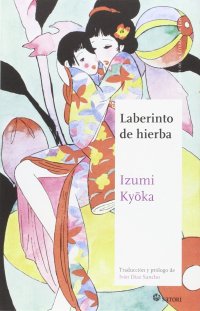
Review of the book “Labyrinth of Grass” by Izumi Kyoka
The book “Labyrinth of Grass” by Izumi Kyoka is a masterpiece of Japanese literature, combining gothic horror with fantasy and mythology. The author, considered one of the great exponents of the neoclassical genre, immerses us in a mysterious and enveloping atmosphere, where reality and dream merge.
The plot focuses on the search for Akira Hagoshi, a young man who wants to remember the children’s song that his mother sang to him before she died. His obsession leads him to the Black Gate, a haunted mansion located in the Akiya Forest, where the secret of life and death is said to be hidden. There, with the help of Kojiro, a pilgrim monk, and old Saihachi, he will have to face the dangers that lurk in the shadows, between the stains on the walls, the sliding doors and the dark grasses of the garden.
The novel is structured like a matryoshka, that is, a story within another. Each chapter reveals a new story, starring secondary characters who have some relationship with the Black Door. Thus, we learn about the legends, myths and traditions that surround that magical and sinister place. Izumi Kyoka uses poetic and suggestive language, full of metaphors and symbols, which transports us to a dreamlike and fascinating world.
One of the highlights of “Labyrinth of Grass” is the way it addresses complex and controversial themes, such as obsession, madness, and the struggle for power. The novel asks difficult questions and offers no easy answers, inviting readers to reflect on their own beliefs and values.
Izumi Kyoka’s writing style is poetic and evocative, making reading “Labyrinth of Grass” an unforgettable experience. The author uses metaphors and vivid descriptions to create a magical, ethereal world that captivates the reader’s imagination. The work also offers a unique insight into Japanese culture of the time, including the customs and traditions of Japanese society.
“Labyrinth of Grass” is a novel that does not leave the reader indifferent, who feels trapped by its atmosphere and its rhythm. It is a work that mixes horror with beauty, nostalgia with hope, memory with oblivion. It is an invitation to explore the deepest corners of the human soul, where the most unspeakable fears and desires are hidden.
Another important theme in the novel is the idea that nature is a reflection of the inner state of human beings. The characters in the book are connected to the garden in different ways, and their experiences in the garden reflect their own internal struggles. The beauty and harmony of the garden is threatened by the presence of dark and disturbed characters, suggesting that the characters’ inner state can affect their natural surroundings and vice versa.
In conclusion, “Labyrinth of Grass” is a masterpiece of Japanese literature that offers a profound reflection on the nature of life and death, and the relationship between humans and nature. It is a captivating read for those interested in Japanese literature and the exploration of universal themes through fiction. Kyoka’s poetic and evocative prose, along with the mysterious and enigmatic atmosphere of the Kugane Garden, make this novel an unforgettable experience for the reader.
Source: https://algunoslibrosbuenos.com/laberinto-de-hierba


